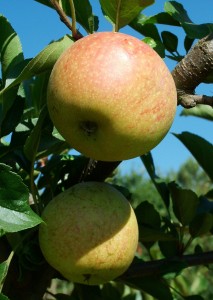24
Aug
Apple Scab Fungus More Resistant to Pesticides
(Beyond Pesticides, August 24, 2011) Scientists say the fungus that causes apple scab appears to be growing more resistant to pesticides routinely used to control the fungus, worsening the threat of outbreaks in commercial orchards. 
For decades, manufacturers have come up with replacements for chemical mixtures the fungus outwitted. By using a rotating lineup of fungicides from year to year, farmers usually stayed a step ahead of the scab. But the fungus now appears to be overcoming multiple fungicides at once. In a paper published this month in the journal Plant Disease, researchers described samples collected in Indiana and Michigan that are resisting all four of the most commonly used chemical treatments: dodine, kresoxim-methyl, myclobutanil, and thiophanate-methyl.
“We’ve dealt with fungicide resistance over the years, but this time we’re losing three or four different classes of completely unrelated fungicides at the same time,” said Henry Ngugi, PhD, a plant pathologist with Penn State University’s Fruit Research and Extension Center. “We have to literally go back to the drawing board.”
Another ominous sign: The fungus apparently hasn’t developed any new weaknesses while evolving to resist the pesticides, unlike what usually happens in nature, the study found. Anecdotal reports from orchard owners and agriculture extension agents suggest the disease is spreading in parts of the Midwest and Northeast, although the situation can vary from one farm to another. Pesticide resistance and wet spring weather have been ideal for the fungus’ growth and spread.
Just one scab lesion can reduce an apple’s value by 85 percent because it cannot be sold as table fruit. It still can be used for juice, sauce or other products, but that brings much less money. In the moist Upper Midwest, some of the most popular apple varieties ”” McIntosh, Gala and Fuji among them ”” are particularly susceptible. Growers apply fungicides up to a dozen times a season to ward off the disease.
Jim Lerew, who grows about 600 acres of apples in York Springs, Pa., said more than half of his crop has scab damage. “It’s definitely the worst … I’ve seen in my lifetime,” he said. Others in the industry say things aren’t so dire. The Michigan Apple Committee is funding research on apple scab but “it’s not something that anyone is panicking about,” executive director Denise Donahue said.
Research has shown that a dependence on chemical-intensive control methods can give rise to resistance. These heavily used chemicals also leave residue behind on apples that consumers eat. The best way to best avoid these chemicals is to eat organic apples.
Fungus management also poses a challenge to organic fruit producers. However, organic systems encourage and enhance preventive techniques including cultural and biological controls which include choosing varieties not susceptible to diseases. Apples in high demand- Gala, Fuji, Granny Smith, McIntosh- are very susceptible to fungi and other diseases making them chemical-intensive. Lesser known varieties — Gold Rush, Empire, Prima, RedFree, Golden Delicious- are resistant to common fungi and other blights, but are not popular with consumers. Beyond Pesticides recommends creating a demand for these varieties by purchasing them when available. This can help shift the market away from chemical dependence and encourage farmers to grow more resistant varieties. For more information on resistant varieties and organic cultivation, read our article “Antibiotics in Fruit Production.”
Visit our “Eating with a Conscience” for more information on how our food buying decisions support or reject hazardous agricultural practices, protection of farmworkers and stewardship of the environment.
Along with chemical residue on fruits, a number of different fungicides have been shown to cause cases of occupational asthma among workers, including the fungicides chlorothalonil, fluazinam, and captafol. Researchers found that these fungicides cause hypersensitivity responses in workers, causing their airways to be highly sensitive and reactive to the inhaled fungicides resulting in wheezing and breathlessness. Thiophanate-methyl, kresoxim-methyl and myclobutanil used on apples that lend to apple scab resistance are carcinogenic and suspected hormone disruptors. Others, like ziram and maneb have been linked to Parkinson’s disease and non-Hodgkin’s lymphoma.
Source: Associated Press










